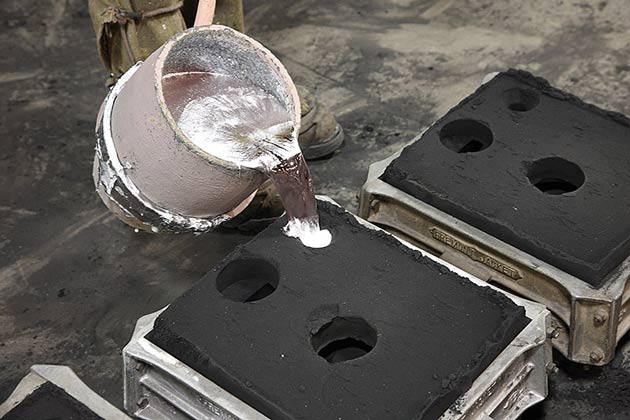Everything about Alcast Company
Everything about Alcast Company
Blog Article
Alcast Company Things To Know Before You Get This
Table of ContentsThe Of Alcast CompanyThe smart Trick of Alcast Company That Nobody is Talking AboutAll About Alcast CompanyAlcast Company Can Be Fun For EveryoneSome Known Facts About Alcast Company.Little Known Facts About Alcast Company.
The subtle distinction hinges on the chemical material. Chemical Contrast of Cast Light weight aluminum Alloys Silicon advertises castability by decreasing the alloy's melting temperature and boosting fluidness throughout casting. It plays an important duty in enabling complex mold and mildews to be filled up properly. Furthermore, silicon contributes to the alloy's toughness and put on resistance, making it useful in applications where longevity is crucial, such as auto parts and engine elements.It also enhances the machinability of the alloy, making it easier to process right into finished items. This way, iron adds to the overall workability of aluminum alloys. Copper enhances electric conductivity, making it beneficial in electric applications. It also boosts deterioration resistance and contributes to the alloy's general toughness.
Manganese adds to the stamina of aluminum alloys and improves workability (Aluminum Castings). It is commonly utilized in functioned light weight aluminum products like sheets, extrusions, and profiles. The visibility of manganese help in the alloy's formability and resistance to splitting throughout manufacture procedures. Magnesium is a lightweight component that gives stamina and impact resistance to light weight aluminum alloys.
A Biased View of Alcast Company
It allows the manufacturing of lightweight elements with excellent mechanical residential or commercial properties. Zinc improves the castability of light weight aluminum alloys and aids manage the solidification procedure throughout casting. It boosts the alloy's stamina and firmness. It is commonly discovered in applications where elaborate shapes and great details are essential, such as ornamental spreadings and certain vehicle parts.

The main thermal conductivity, tensile strength, yield toughness, and prolongation vary. Select suitable raw products according to the performance of the target product generated. Among the above alloys, A356 has the highest thermal conductivity, and A380 and ADC12 have the most affordable. The tensile restriction is the opposite. A360 has the finest yield strength and the highest elongation price.
The Definitive Guide for Alcast Company

In precision spreading, 6063 is appropriate for applications where detailed geometries and high-grade surface finishes are vital. Examples consist of telecommunication units, where the alloy's superior formability allows for sleek and visually pleasing styles while preserving structural stability. In the Illumination Solutions sector, precision-cast 6063 elements develop sophisticated and effective illumination fixtures that call for intricate shapes and good thermal performance.
The A360 shows superior elongation, making it ideal for complicated and thin-walled components. In precision casting applications, A360 is well-suited for markets such as Customer Electronics, Telecommunication, and Power Tools.
Getting My Alcast Company To Work
Its unique residential or commercial properties make A360 a useful selection for accuracy casting in these markets, enhancing item resilience and quality. Casting Foundry. Aluminum alloy 380, or A380, is an extensively utilized casting alloy with several distinctive characteristics.
In accuracy spreading, aluminum 413 radiates in the Customer Electronics and Power Equipment industries. It's typically used to craft complex parts like mobile phone real estates, cam bodies, and power tool cases. Its precision is exceptional, with limited tolerances up to 0.01 mm, ensuring perfect item assembly. This alloy's remarkable deterioration resistance makes it a superb selection for exterior applications, making certain resilient, resilient products in the stated markets.
The 25-Second Trick For Alcast Company
As click for source soon as you have actually decided that the aluminum die casting process appropriates for your job, a crucial next step is selecting one of the most suitable alloy. The light weight aluminum alloy you choose will considerably impact both the spreading process and the residential or commercial properties of the end product. As a result of this, you should make your decision very carefully and take an educated method.
Figuring out the most appropriate light weight aluminum alloy for your application will certainly imply considering a large range of attributes. These relative alloy qualities follow the North American Die Spreading Association's standards, and we've divided them into 2 categories. The very first group addresses alloy qualities that impact the production process. The 2nd covers features influencing the residential or commercial properties of the last product.
Get This Report on Alcast Company
The alloy you select for die casting directly impacts several elements of the casting process, like how easy the alloy is to collaborate with and if it is susceptible to casting defects. Hot fracturing, also understood as solidification breaking, is a typical die spreading issue for light weight aluminum alloys that can cause internal or surface-level splits or cracks.
Certain aluminum alloys are more prone to warm breaking than others, and your choice needs to consider this. Another common flaw found in the die spreading of light weight aluminum is pass away soldering, which is when the actors adheres to the die wall surfaces and makes ejection difficult. It can damage both the actors and the die, so you need to try to find alloys with high anti-soldering buildings.
Corrosion resistance, which is currently a remarkable feature of light weight aluminum, can differ substantially from alloy to alloy and is a crucial characteristic to think about relying on the ecological conditions your item will be exposed to (Aluminum Casting). Use resistance is one more building generally sought in aluminum products and can separate some alloys
Report this page